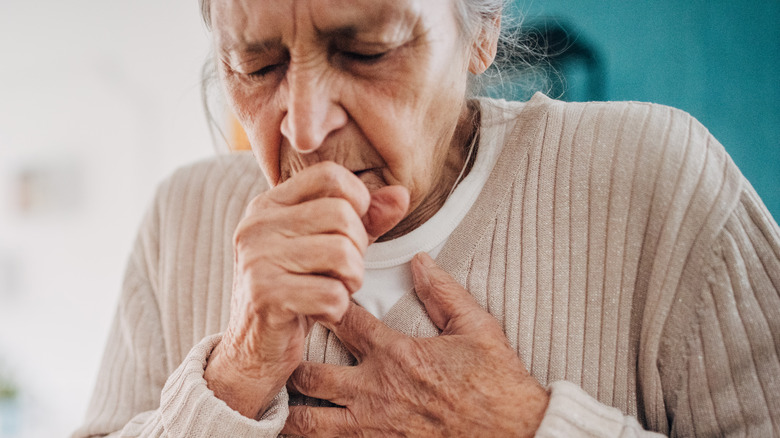Can You Actually Die From Hiccups?
Odds are, you've probably experienced a bout of hiccups before and likely will again. While it may seem as if those little "hic" noises can affect any one of us at any time, there are some people who are more susceptible to hiccups than others. This includes individuals who regularly experience stress, anxiety, or excitement, reports the Mayo Clinic. It is also not uncommon for hiccups to emerge after drinking a soda, eating a heavy meal, or sometimes following an abdominal surgical procedure.
For most people, hiccups usually don't last very long. Males, however, tend to be more prone to extended bouts of hiccups. Knowing this, you might be wondering, are there any potential health risks associated with long-lasting hiccups? Furthermore, is it possible these kinds of hiccups might even be life-threatening? While rare, it turns out that they can be, according to 2012 research published in the Journal of Neurogastroenterology and Motility.
Hiccups that carry on for more than two days are known as "persistent hiccups." If hiccups last longer than a month, it is known as "intractable hiccups" (per Current Neurology and Neuroscience Reports). While this may sound extreme, research shows that hiccups are responsible for more than 4,000 hospitalizations annually across the country. Men and middle-aged to older adults make up more than 90% of cases of intractable hiccups.
Intractable hiccups may signal a health problem
A hiccup — scientifically referred to as "singultus" — occurs when the diaphragm and the muscles between our ribs undergo a sharp spasm that propels air into the lungs and prompts the voice box to close up, producing that all too familiar "hic" sound (per Journal of Neurogastroenterology and Motility).
Intractable hiccups are usually linked to an underlying health issue. In one case study, the health condition responsible for a patient's hiccups was found to be arthritis of the joint that attaches the collarbone to the breast bone (via Current Neurology and Neuroscience Reports). Ongoing hiccups may also be indicative of pneumonia; uremia; or diseases of the bowel, esophagus, or stomach, according to the National Organization for Rare Disorders (NORD). Researchers from an early 1991 study published in the Journal of the Neurological Sciences also drew a connection between intractable hiccups and damaged brain stem tissue.
Therefore, if a person's intractable hiccups are related to a life-threatening underlying condition, the outcome could be fatal without treatment.
In rare instances, hiccups themselves can be fatal
Although chronic hiccups can be a sign of a potentially fatal underlying disorder, in rare cases, it can be the hiccups themselves that pose a risk of mortality. Research has highlighted how serious, long-lasting cases of hiccups can increase one's risk of dehydration, exhaustion, weight loss, malnutrition, and death (per Journal of Neurogastroenterology and Motility).
Recommendations for hiccup treatment can vary. Some studies have shown that medications, such as certain anticonvulsants or gabapentin, may be effective in treating intractable hiccups. A phrenic nerve block or ablation procedures may be helpful for those experiencing hiccups related to a surgical procedure or certain health conditions like lung cancer or stroke. Acupuncture has also been implemented in the treatment of severe hiccup cases.
Of course, some people continue to swear by many age-old, at-home treatment methods like holding your breath, eating a spoonful of sugar, biting down on a lemon slice, gargling cold water, or having someone jump out and scare you. However, the efficacy of such methods is not definitive. "There is a lack of good quality evidence to recommend specific treatment for hiccups," Drs. Rouse and Wodziak noted in Current Neurology and Neuroscience Reports.



